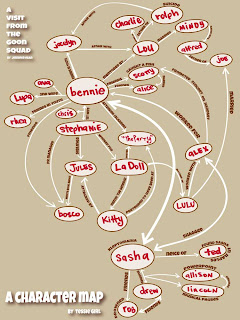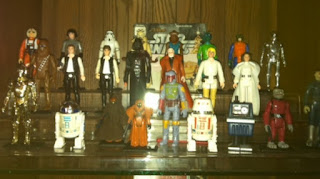Genre, Genre, Genre!
(after Marcia, Marcia, Marcia!)
I forgot to mention this blog is a year old, which makes it the longest kind of journal I've ever kept in my entire life.
I really like this post at the Mumpsimus about Alexander Irvine's book "The Narrows" (concidentally the name of a place both in my own Angel Book, and in Gotham City). It got me thinking about my own book (the Angel one, the dead lesbians) out there in some mail truck somewhere, making the journey to the big city. He talks about defining genre, and whether or not it's even possible, or necessary. The lead character in The Narrows is an Everyman, a character who isn't heroic but understandable, someone we all identify with, and so it's almost incidental the story involves the fantastic.
I wouldn't know how to categorize the Angel Book. It's not sci-fi or fantasy in any traditional sense. No space ships or ray guns or elves or dwarves. Since nearly all the characters are dead, and as a result possess abilities they didn't have in life, it involves the fantastic. But the lead character, Teresa, is someone I'd consider an Everyman. Everywoman. Everyperson. Something. She's a waitress, an adoptive parent with one year of college and lots of bills. A lot of the book takes place in the living world, where gas prices are high, where grief prohibits families from moving on or coming together; in the world of the dead, things are more uncommon, increasingly so, but I hope it's recognizable at least.
I prefer stories that resist categorization. Sometimes I think some people use genre as a dirty word, a way to dismiss a work without really having to judge it on its own merits. Genre has its purposes, most of which are self-evident, but sometimes you wish the whole idea would just die. And then maybe genre could come back as Everygenre, where everyone understands it, and no one really notices.
I forgot to mention this blog is a year old, which makes it the longest kind of journal I've ever kept in my entire life.
I really like this post at the Mumpsimus about Alexander Irvine's book "The Narrows" (concidentally the name of a place both in my own Angel Book, and in Gotham City). It got me thinking about my own book (the Angel one, the dead lesbians) out there in some mail truck somewhere, making the journey to the big city. He talks about defining genre, and whether or not it's even possible, or necessary. The lead character in The Narrows is an Everyman, a character who isn't heroic but understandable, someone we all identify with, and so it's almost incidental the story involves the fantastic.
I wouldn't know how to categorize the Angel Book. It's not sci-fi or fantasy in any traditional sense. No space ships or ray guns or elves or dwarves. Since nearly all the characters are dead, and as a result possess abilities they didn't have in life, it involves the fantastic. But the lead character, Teresa, is someone I'd consider an Everyman. Everywoman. Everyperson. Something. She's a waitress, an adoptive parent with one year of college and lots of bills. A lot of the book takes place in the living world, where gas prices are high, where grief prohibits families from moving on or coming together; in the world of the dead, things are more uncommon, increasingly so, but I hope it's recognizable at least.
I prefer stories that resist categorization. Sometimes I think some people use genre as a dirty word, a way to dismiss a work without really having to judge it on its own merits. Genre has its purposes, most of which are self-evident, but sometimes you wish the whole idea would just die. And then maybe genre could come back as Everygenre, where everyone understands it, and no one really notices.


Comments